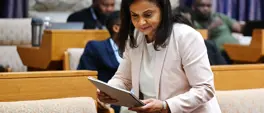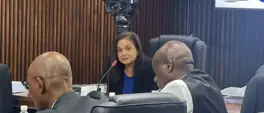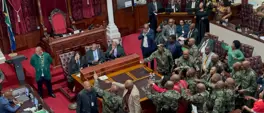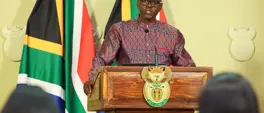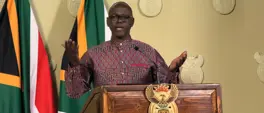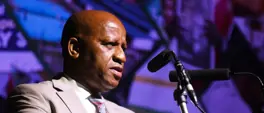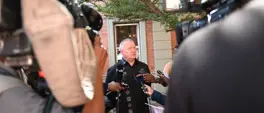BOITUMELO MPAKANYANE: The only way to safeguard and deepen SA’s democracy is through electoral reform
Boitumelo Mpakanyane
14 November 2024 | 11:54Electoral reform isn’t just a technical matter for political insiders; it’s a lifeline for every South African who wants to see real change, accountability, and a government that responds to their needs, writes Boitumelo Mpakanyane.
South Africa’s democracy is under siege. Not from foreign powers or insurrections but from within - by some of the very parties that swore to protect and uphold it.
There is broad, backroom consensus among the political establishment and powers for whom they are proxies to stubbornly oppose desperately needed changes to our electoral system - which would infuse our political system with mechanisms for true accountability, signalling a growing decay in the soul of our country’s political life.
By upholding an outdated electoral system that severs the bond between politicians and the people, the political establishment is actively undermining South Africa’s democracy.
To make matters worse, these same lawmakers have manipulated legislation to impose minimum electoral thresholds. These thresholds require parties to meet a minimum percentage of votes to gain representation, effectively skewing the system in favour of large parties and silencing smaller voices.
This self-interested manoeuvre blocks our citizens' potential to shape the South Africa they deserve.
Where does this leave us?
Well, the establishment has already shown us that they are either uninterested or unable to solve our most defining problems. Now, they are equally committed to nothing other than making sure we cannot use our one mechanism of formal democratic expression: reimagining a new politics.
So, who is this bogeyman establishment?
To understand this, we must look back to the New Nation judgement of 2020, when the Constitutional Court declared certain provisions of our Electoral Act unconstitutional, to the extent that it required anyone who sought to serve their country in a public representative role, in the Parliament or Provincial Legislatures, to be a member of a political party, elected through a closed party list.
Determining this defect, the court sent the Act back to Parliament to be revised, thus creating a moment to reimagine our entire electoral system by actually placing true democratic power in the hands of South Africans.
But they instead decided to effect the bare minimum reform required to comply with the ruling of the court. Now, this wouldn’t be an issue if South Africans didn’t, daily, decry their inability to do anything about the endemic corruption in our politics, their inability to reach their leaders and representatives, and most importantly, their inability to hold them accountable, so from this, it is obvious that the majority of South Africans demanded reforms that hold politicians accountable.
So, to answer the question above, the establishment is the parties that repeatedly choose to entrench their own interests and the interests of those for whom they are proxies, rather than allow our young democracy to grow into one that emphasises people’s power - namely the African National Congress (ANC), Democratic Alliance (DA) and the Economic Freedom Fighters (EFF).
Rather than seizing this moment to create processes that foster governments and legislatures that genuinely serve the people, they opted to maintain a system that keeps politicians safely within their party’s grasp, free from public scrutiny and accountability.
South Africa’s current electoral system was crafted in the early days of our freedom. Back then, the pure proportional representation model served an immediate purpose: a negotiated settlement intended as a unifying instrument, designed to reflect the broad diversity of a nation emerging from the shackles of apartheid.
But today, this system no longer serves the needs of the people. Instead of encouraging a responsive and accountable government, it has allowed politicians to hide behind party structures, insulated from the very communities they are meant to represent.
Our politicians, conveniently forgetting the importance of direct accountability, seem unbothered by the spiralling voter turnout - a clear sign of public disillusionment with politics and election processes. In this year’s general elections, turnout plummeted to a new low, achieving a turnout of only 58% among registered voters and with over 60% of the voting-age population opting out of the democratic process. This trend shows no sign of reversing.
Why would South Africans, particularly young people, engage in a political system that offers them no power over their representatives?
Without a direct link to those in power, they are effectively disenfranchised. The warning signs have been here for decades; the Van Zyl Slabbert Commission highlighted this democratic deficit in 2003, calling for a Mixed-Member system incorporating both Proportional Representation and Constituency governance to restore and enhance accountability.
But our leaders ignored it.
Now, as democracy languishes, the same leaders shrug off these systemic flaws, and instead endorse minimum thresholds that only further erode the people's voice.
But the Electoral Amendment Bill and now Act isn’t the only piece of ill-intended lawmaking. The Municipal Structures Amendment Bill aggressively pursued by the Democratic Alliance (DA) and ANC (the naked hypocrisy will soon become evident) seeks to impose a minimum threshold of 1% for a party to become represented in a municipal council, ignoring the fair formula determining seat allocations.
Their justification for these electoral thresholds is both flawed and disingenuous. They claim these minimum thresholds are necessary to “stabilise” governance, citing coalition politics as the culprit for local government dysfunction. Yet the true source of this instability is not the small parties; it’s the larger parties, in particular the ANC and DA’s cynical exploitation of smaller but equally crooked coalition partners to deflect responsibility for their own longstanding governance failures.
The hypocrisy of this act is best described by looking at the City of Johannesburg’s immediate past mayors from the Al Jama-ah Party, noting who put them there. Following the removal of Mayor Mpho Phalatse, the DA was presented by ActionSA and the Patriotic Alliance (PA) with an opportunity to retake control of the embattled city. But given the poisoned chalice it had already become as a consequence of their governance, they decided instead to allow the management of our most important city to be placed in the hands of scapegoats, because they refused to take their fair share of political responsibility so close to a national election.
Following this, the ANC was free to install Al Jama-ah and its useful idiots to run the city while controlling them behind the scenes. The DA and the ANC have been in charge of the decline all along.
But make no mistake: this erosion of democracy isn’t just a problem for today. The future legitimacy of our democracy hinges on our ability to make disaffected young people believe in politics again.
To re-engage them, we must place as much power as possible directly into their hands. South Africa needs a system where citizens can hold their representatives accountable, where politicians are forced to respond to the people they serve, and where every vote truly matters.
Only by introducing constituency governance and resisting restrictive and burdensome thresholds can we bridge the growing divide between the people and politicians who want to govern.
Electoral reform isn’t just a technical matter for political insiders; it’s a lifeline for every South African who wants to see real change, accountability, and a government that responds to their needs. Whether we’re struggling with economic challenges, fighting for quality education, battling with job scarcity, or fearing for our lives in our war-zoned communities, these issues are all tied to how our leaders govern - and ultimately, how they’re held accountable.
Right now, many young people see no point in voting—they feel their voices don’t matter and that nothing changes. However, if our society agrees to create an electoral system that directly links elected officials to specific communities, young people and all citizens would finally have a genuine stake in the political process.
They could hold politicians accountable, fostering a culture where representatives must deliver or face the consequences.
And let’s be clear: the future of our democracy hinges on this. Without meaningful electoral reform, we will continue to see declining voter participation, widening political apathy, and an entrenchment of power among a disconnected elite. Electoral reform is essential to breathe new life into South Africa’s democracy and ensure it truly represents all South Africans. It’s about building a government that serves its people—not itself. Every South African should care about this because it is the foundation of a more responsive, fair, and equal society.
We cannot let the establishment continue to erode our democracy. It’s time for South Africa to wake up, to demand an electoral system that empowers citizens rather than party elites. We must reject the imposition of minimum electoral thresholds and fight for a system that guarantees both accountability and inclusivity.
If our leaders are unwilling to champion this reform, then we, the people, must take up the mantle. The soul of South Africa’s democracy is at stake, and it’s up to us to save it.
Boitumelo Mpakanyane is RISE Mzansi’s Head of Internal Democracy.
Get the whole picture 💡
Take a look at the topic timeline for all related articles.
Trending News
More in Opinion

12 December 2025 15:34
CHARLES MATSEKE | The Republic of commissions arrives at its point of no return

12 December 2025 14:15
REBONE TAU | Ekurhuleni needs bold, decisive leaders to reverse years of capture

12 December 2025 05:13
MANDY WIENER | Searching for a superhero with a spine of steel: Why the position of NDPP matters so much

